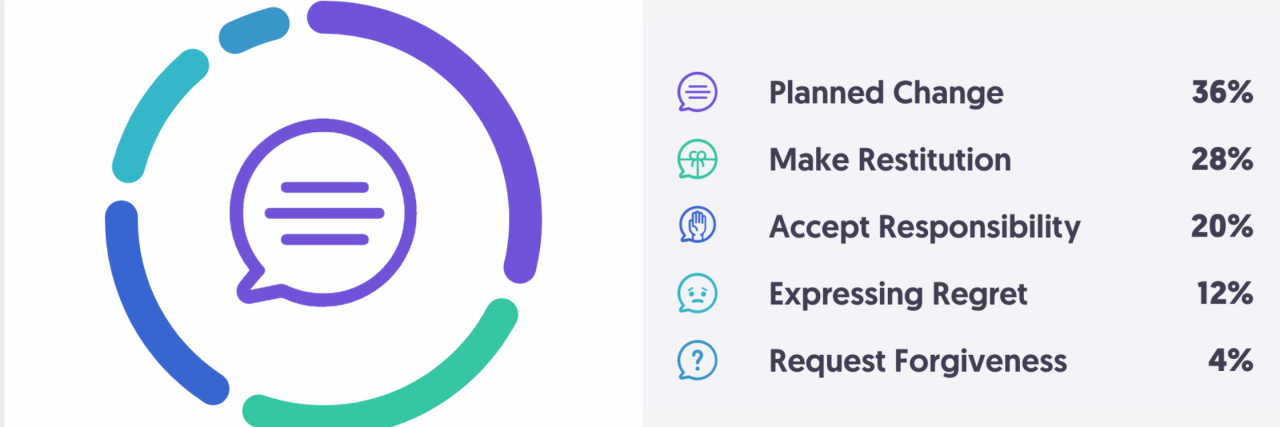You’ve heard of love languages and attachment styles, but have you ever heard of apology languages?
Coined by Gary Chapman and Jennifer Thomas, the same man who is known for defining the love language styles, apology languages are the way you receive and give remorse over your actions. Similarly to how some people may better interpret affection through gifts or acts of service, there are different ways people give and receive apologies. What if you tell someone, “I’m sorry,” verbally, but that expression isn’t what they’re looking for? Behavioral changes are what they need to actually move on, but you genuinely gave them words instead.
Yes, knowing your love languages is important, but also knowing your apology languages (giving and receiving) is equally as important to healthy and functioning relationships, especially if you’ve lived through trauma in any way.
According to Chapman and Thomas’ book “The Five Languages of Apology,” the five apology languages are:
1. Expressing Regret
This apology language focuses on the emotional pain caused to a person. It commands that you focus in and hone in on the harm you did, and tell them that you’re sorry you did it and if you knew better, you would have done better. That, or you should have known better. Sincerity is key here.
“I’m so sorry I was late, and I hate the pain that this causes you. I should have been on time. I apologize.”
2. Making Restitution
When your primary apology language is making restitution, the other person will have to see the change before they really believe it. Talk is cheap, what are you going to do to not let this happen again? Additionally, I need to see you do it before I believe you. See what I’m saying?
If your friend is mad because you’re late, this may mean you have to continually show up on time afterward for them to move forward and actually forgive you. The proof is in the pudding.
3. Requesting Forgiveness
Some people need to hear you physically say, “Will you forgive me?” in order for them to move forward. There’s a difference between requesting forgiveness, and saying, “You must forgive me,” because that’s quite frankly a massive red flag. Requesting forgiveness as an apology language means you’re opening yourself up completely to the other person, leaving yourself vulnerable.
“I was late, and I shouldn’t have been. Can you forgive me?”
4. Accepting Responsibility
If someone’s primary apology language is accepting responsibility, they need you to outright say, “Yo, I was wrong for that.” This means acknowledging what you did, and how you inconvenienced or hurt them.
“I was late, and that caused us to miss our appointment. This is completely unacceptable, and it’s on me.”
5. Planning for Change
Planning for change is actively planning and making changes so the grievance doesn’t happen again. Verbalizing that you plan to change, and that you are actually making the efforts to do so are important, or else it’s all talk. This is supposed to be constructive, and not reductive or manipulative.
“I’m sorry I was late. I’m going to try to make changes in the future so that doesn’t happen, like setting alarms earlier or trying to better handle my time.”
After taking the official apology languages test, I learned that my apology languages are ranked as the following.
- Planned change | 36%
- Make restitution | 28%
- Accept responsibility | 20%
- Expressing regret | 12%
- Request forgiveness | 4%
What’s important about this is that if you notice, all of the languages come into play. For me, planned change is what matters the most. It acknowledges that you did something that hurt me, and you don’t want to do it again in the future. However, right under that is making restitution. I need to see the change happen. Generally speaking, this covers a lot of bases of conflict for me, but there are times that really all I need is for you to accept responsibility for your actions. Then there are moments where I do need to hear “I’m sorry,” or else it’ll bother me for years. Different situations call for different responses, and no language is better than the other. Some I may be more receptive to, but it doesn’t mean that it’s inherently going to make things better.
Knowing your apology language can be so crucial when it comes to healing from trauma. Knowing not just how they hurt you, but what can be done in the future to heal is the other half of the puzzle.
Applying the apology language theory to healing would mean that you know what you need from the other party to heal, and it potentially can allow you avenues and paths on your healing journey should that apology not actually come. You know what you’re missing, how can you find it?
Take the official apology language quiz here, and comment below what your ranking is.
Lead image courtesy of contributor and 5lovelanguages.com

